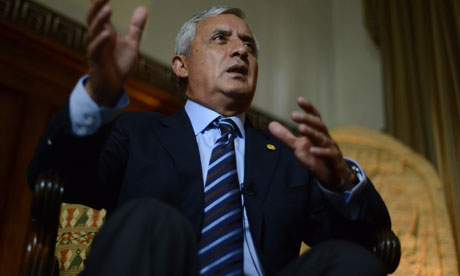International labour activists have called on Guatemala to investigate a wave of murders targeting trade unionists in the country, or risk losing its favoured trade status with the European Union and the US.
The Central American nation is considered to be the most dangerous place in the world to be a trade unionist, according to the International Trade Union Confederation: in the past five years it is estimated that at least 58 trade union members have been killed in Guatemala, but no one has ever been convicted of the crimes.
An international delegation of trade union members is meeting the Guatemalan president on Wednesday to urge his government to investigate the deaths. The delegation from Public Services International (PSI), a global trade union federation representing 20 million public service workers worldwide, hopes its visit will help stop the violence directed at its affiliates in Guatemala.
"We stand in solidarity with our members who are being targeted for simply exercising their legal rights to belong to a union, for their bravery in exposing corruption and nepotism and defending public services against privatisation," said Rosa Pavanelli, PSI general secretary.
In March 2013 the Guatemalan government signed an agreement with the International Labour Organisation to investigate and prosecute crimes against trade union members. However, days after the mission left the country three trade unionists were murdered.
Carlos Hernández, an executive member of the National Trade Union of Health Workers, was shot dead by two men on a motorbike in his home town of Chiquimula, close to the Honduran border.
The prominent leader had previously received death threats while campaigning for better rights for workers and indigenous land owners.
The current union membership in Guatemala stands at 1.6% of the working population.
Luis Alberto Lara Ballina has been a trade unionist for 20 years: "I've received a lot of death threats because of my involvement in el sindicato. They're delivered to my door, to my neighbours' doors or sometimes as blood-stained invitations to my own funeral. But we keep on fighting because there's no justice for workers here."
The delegation hopes that Wednesday's meeting with President Otto Pérez Molina will spur the Guatemalan government to take action over the deaths and ensure workers' lives and legal rights are respected. PSI has arranged to meet with members of the European Parliament next month to discuss Guatemala's free trade agreement with the EU.
"There can be no trade without justice for workers and their communities," said Pavanelli.
• This article was amended on Thursday 15 August to give the full name of Luis Alberto Lara Ballina.



